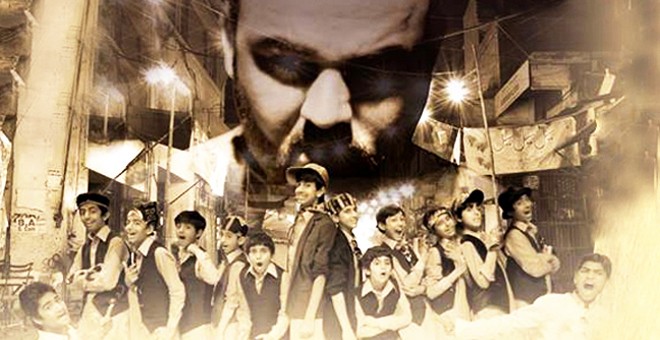

Charles Dickens is one of the most proficient novelists of the English language. Therefore, it is not surprising to hear about movies, plays and even musicals being based on his works. One of Dickens’s most famous novels, Oliver Twist, was recently adapted for stage by Lahore Grammar School’s Johar Town branch -- that too as a Punjabi Musical. Titled Bholoo, the play was performed at Alhamra The Mall.
It was directed by Mobeen Ejaz and Patrice Fouquet, with the Punjabi script provided by Saeed Asghar.
Much like Dickens’s Oliver Twist, the said Musical chronicles the journey of a young boy, Bholoo, from a camp of child labour, through forced participation in a gang of thieves to a life of freedom and dignity.
To add local colour, the play was set in the present-day inner city of Lahore. As Patrice Fouquet explained, "The condition(s) of children in the Victorian period… is still largely prevalent in Pakistan where forced child labour and trafficking are common."
Apart from dispensing with the sub-plot concerning Oliver’s parentage, the story-line was minimally modified. Telling the tale of innocent children disadvantaged by their families’ poverty, the play highlighted the widening gap between the haves and have-nots in a Pakistani society.
Even though Dickens’s 19th-century London and today’s Lahore are centuries’ apart in time, the plight of under-privileged citizens in both eras is, unfortunately, still the same. Contextualising Oliver Twist’s story into an ‘androon’ Lahore setting, the play very poignantly shows how the poor have to beg for ‘huur’ food while the rich eat ‘dau parathay’ each.
The quest for more, and better, food is what initially drives Bholoo, the protagonist, to run away from Pakistan’s version of the Victorian workhouse, the brick-making ‘Bhatta’. Bholoo escapes from the bhatta only to be fooled into becoming part of Chacha Jugnoo’s gang of thieving boys. His final rescue by the well-meaning Professor Ghulam Mustafa provides Bholoo’s happy-ever-after without turning it into a fairytale ending.
Sadly, fairytales are something the street children portrayed in the play have probably never heard of. The names and the abuses hurled at them daily, by all segments of society, rob them of their childhood innocence much too soon.
Just as Dickens was considered a master at matching his characters’ names with their personalities, Bholoo is the perfect epithet for the central character of the Punjabi musical. Played by Harris Farooq Shah, a 3rd grader, Bholoo is the personification of innocence bewildered by the evil surrounding it.
Shah’s brilliant portrayal of an inherently honest person’s reluctance at being forced to partake in criminal activities is commendable. So is Saad Ahmed’s smart-alecky take on Artful Dodger’s character as Sheeda Batair. Mohammad Faheem’s turn as the supportive and sincere Allah Rakha is also worth mentioning.
Director Mobeen Ejaz as Lahore’s Fagin in the guise of Chacha Jugnoo is entirely believable as the man who bullies homeless children into beggary for his own gain. Tehseen Wajahat’s villainous and cruel Billa Dakait provides the most apt antithesis to Bholoo’s innocent charm. From the policemen to the Thaikay Dar in the first scene, the entire cast fit their roles to a T, lending cohesiveness to a story that portrays the lack of stability in a poor orphan’s life.
This grimness of Dickens’s story has been offset by setting the action to music. The opening act is punctuated by dhol beats that escalate in tempo with the unfolding story.
Composed by Rakae Jamil, the soundtrack alludes to the presence of hope by remaining upbeat. The music and lyrics of the title song, ‘Aja vey,’ in particular lend a respite to the characters as well as the audience, from the unfortunate plight of Bholoo.
To showcase the resilience of human nature, dance choreography by Adnan Jahangir has been utilised a couple of times in the play. Staying true to Bholoo’s origins, the dances are appropriately Punjabi in style and in sync with the characters’ personalities. It goes to the choreographer’s credit that he managed to portray an entire scene with traditional Luddi style dance set to instrumental music.
Along with dance, the Punjabi language was instrumental in converting Dickens’s Victorian tale into the story of underprivileged children trying to survive in Pakistani galis and mohallas. The directors’ effort to remove the misconception that all Punjabi theatre is vulgar is laudable. Their aim to change the perception of theatre conducted in the Punjabi language has started at the correct level--the elite schools. Only by educating school children, and through them, their parents, can anybody hope to alter Punjabi’s image as out-dated and preserve the language.
Coming soon after the Punjabi Bachao week, the well-acted, directed and choreographed Bholoo The Musical hopefully signifies a better future for the language that 45 percent of Pakistanis call their mother-tongue.